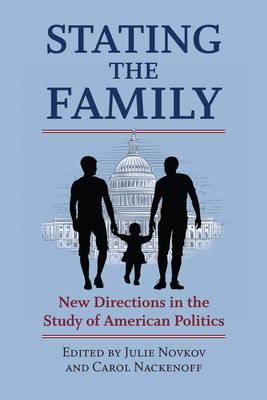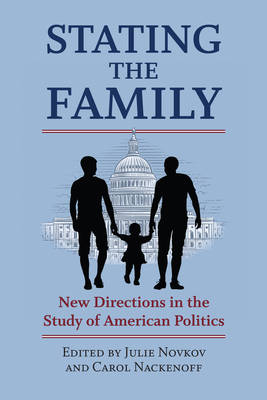
Bedankt voor het vertrouwen het afgelopen jaar! Om jou te bedanken bieden we GRATIS verzending aan op alles gedurende de hele maand januari.
- Afhalen na 1 uur in een winkel met voorraad
- Gratis thuislevering in België
- Ruim aanbod met 7 miljoen producten
Bedankt voor het vertrouwen het afgelopen jaar! Om jou te bedanken bieden we GRATIS verzending aan op alles gedurende de hele maand januari.
- Afhalen na 1 uur in een winkel met voorraad
- Gratis thuislevering in België
- Ruim aanbod met 7 miljoen producten
Zoeken
Stating the Family
New Directions in the Study of American Politics
Paperback | Engels
€ 55,95
+ 111 punten
Omschrijving
Glance at a political party's platform, catch a politician's speech, sample the news, and you will find the family--not as a mere group of people living together in the private sphere, but as a contentious entity at the center of political disputes and policy debates over everything from marriage equality and gender identity to immigration and welfare reform. The key role of the family in politics and public policy, so often relegated to the outer margins of political science and theory, comes in for long overdue consideration in this volume. Bringing together political scientists and legal scholars of wide-ranging interests and perspectives, Stating the Family explores the role of the family in American political development: as a focus of political struggle, a place where policy happens, a means of distributing governmental goods, and a way of relating individuals to the state and to each other in legal terms. While the authors gathered here examine important policy questions that relate to the family--including immigration, welfare, citizenship, partisanship, and ideology--they pay particular attention to changes in family structures and responsibilities in light of the rise of neoliberalism. Illustrated with case studies--some contemporary, some historical--their essays provide individual takes on different links between family and politics, creating a nuanced conversation on this complex topic. The result is a multifaceted view of the familyâ (TM)s place in the development of American political institutions and a unique understanding of the work that family does to structure politics--and that politics does to structure families.
Specificaties
Betrokkenen
- Uitgeverij:
Inhoud
- Aantal bladzijden:
- 288
- Taal:
- Engels
Eigenschappen
- Productcode (EAN):
- 9780700629237
- Verschijningsdatum:
- 7/05/2020
- Uitvoering:
- Paperback
- Formaat:
- Trade paperback (VS)
- Afmetingen:
- 152 mm x 229 mm
- Gewicht:
- 453 g

Alleen bij Standaard Boekhandel
+ 111 punten op je klantenkaart van Standaard Boekhandel
Beoordelingen
We publiceren alleen reviews die voldoen aan de voorwaarden voor reviews. Bekijk onze voorwaarden voor reviews.










